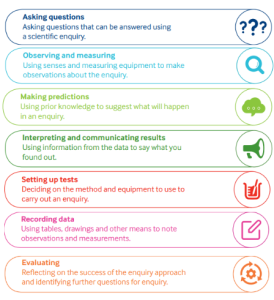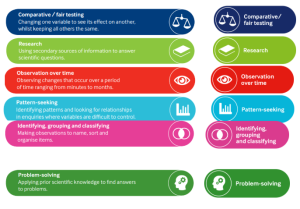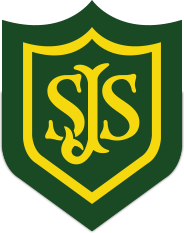Science

Science
Science
At St John’s Highbury Vale, we encourage children to be curious. To develop this curiosity, we believe that it is important for children to have hands-on scientific opportunities across their school career.
Intent
At St John’s, our science curriculum has been carefully designed using White Rose Science resources as a foundation, enriched by the enquiry-based approaches promoted by the Primary Science Teaching Trust
Our intent is to:
- Provide a broad and coherent science curriculum that builds secure understanding of scientific knowledge, concepts, and vocabulary across biology, chemistry, and physics
- Foster awe and curiosity about the natural world, encouraging children to ask questions, explore ideas, and think like scientists
- Embed working scientifically skills—such as observing, classifying, testing, measuring, predicting, and drawing conclusions—through practical enquiry and investigation
- Ensure that science is accessible to all learners, promoting inclusion, high expectations, and progression for every child
- Develop children’s ability to communicate scientific ideas confidently, both orally and in writing, using appropriate scientific language

 Implementation
Implementation
Science is taught as a discrete subject each week, with carefully sequenced units that build on prior learning and introduce new concepts in a clear and coherent manner. Each unit focuses on key scientific knowledge, vocabulary, and enquiry skills aligned to the National Curriculum.
Each lesson begins with retrieval in the form of a memory platform (a question from last lesson, last week, last term and last year). This retrieval practice helps pupils transfer knowledge from their working memory to long term memory. Vocabulary is then explicitly taught through visuals, examples and non-examples. All science vocabulary has been tiered (tier 1, tier 2, tier 3) on medium term plans. New learning is presented through demonstrations, diagrams, models and/or videos. Children have an opportunity to explore using equipment and artefacts. Children use stem sentences and scientific vocabulary while discussing their observations.
Lessons are sequenced to revisit and build upon previous learning, enabling pupils to deepen their understanding over time. Scientific enquiry is embedded and mapped throughout the curriculum. Children engage in a variety of enquiry types—such as observation over time, pattern seeking, comparative testing, classification, and research—ensuring they experience the full range of scientific investigation.
Our curriculum is enriched with STEM opportunities, British science week activities, educational visits, and local community links to broaden pupils’ experiences and demonstrate the importance of science in everyday life.
Impact
Through the structured progression of disciplinary and substantive knowledge, pupils build a solid foundation in scientific concepts across biology, chemistry, and physics. This knowledge is regularly revisited and applied in increasingly complex ways, helping children retain what they’ve learned and make meaningful connections across topics.
The emphasis on enquiry-based learning, drawn from the Primary Science Teaching Trust, ensures pupils are not passive recipients of facts, but instead become active investigators. They learn to ask questions, plan and carry out fair tests, observe, record, and draw conclusions from data. This empowers them to think critically and apply scientific skills independently.
Science Long Term Planning 2024 – 2025
Science Disciplinary Knowledge Progression
Science Substantive Knowledge Progression

